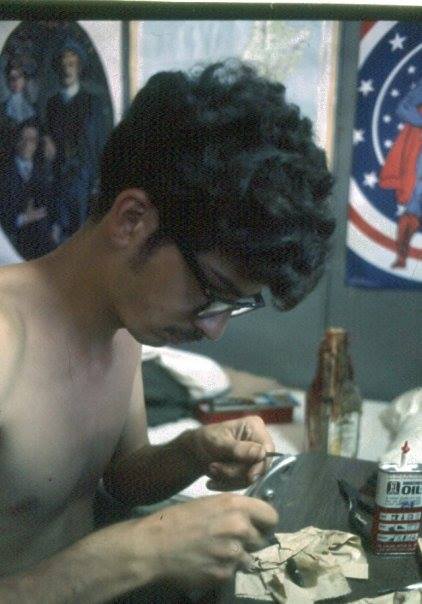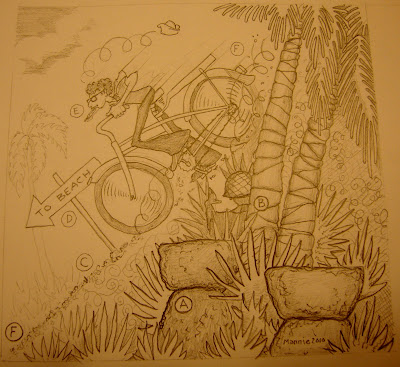"Early adulthood: Individuals in early adulthood typically expect a long life ahead of them, and consequently do not think about, nor worry about death."
Lifespan Development, OER Services, Chapter 10, Death and Dying.
How often do you get to hear someone say -
"It cannot be overstated how foolishly stupid I was."
Here is the proof:
---
In July of 1944, after two and a half years of brutal Japanese occupation, the island of Guam (Guahan) saw an enormous amount of fierce combat as the Americans returned to liberate the island and its people.
The Battle of Guam lasted from July 21 through the surrender of the last Japanese stronghold on Mount Santa Rosa on 10 August 1944. The combat was as ferocious as any other fight on the many islands the South Pacific. Although the battle ended on the 10th, the mopping up continued for months, as there remained 5,000 Japanese soldiers throughout the island who refused to surrender; indeed, the last Japanese holdout, Shoichi Yokoi, wasn't captured until January 24, 1972. I was on the island when that happened...but that is a story for another time.
I was stationed on Guam from 1971 to 1972, that was when the war was in living memory of most of the adults on the island, and the detritus of the war was everywhere.
Shot-up tanks, sunken landing craft, abandoned artillery, pillboxes and bunkers were everywhere; and, of course, there was lots of unexploded ordnance still lying around.
Add to the above, and eighteen-year-old ignoramus with a love of history, and you have a recipe for fun, and perhaps, disaster.
I always had a fascination and appreciation for history, including WWII history, so I was almost giddy to be stationed on a battlefield of that war, and I was always on the lookout for evidence of the battle.
Boonie-stomping
Hiking through the jungles and highlands of the island is called "boonie-stomping", and that is how I spent nearly all of my time off, either with buddies, or usually, by myself. These solitary hikes remain some of my best memories. My pals used to joke about how I was spending all of my time on the island staring at the ground, and they were partially right. Whenever I was going down a trail I kept my eyes peeled for stuff from the war...and I found lots and lots of it (more than my forward-looking friends).
Bullets, shells, shrapnel, buckles, a helmet...my collection continued to grow and grow.
One of my usual haunts was outside the village of Yigo. It was the site of a major battle and a sharp eye would always yield a bullet or two.
The Yigo battlefield is the site of the Peace Memorial and is a place of pilgrimage for many Japanese who lost family members in the war.
The stark-white monument is a stylized pair of praying hands. Within it, I'd often find bundles of smoldering incense and small bottles of sake left on an alter-like plinth. The exposed bluff in the background was where I'd always find bullets, and in the position from which this photo was taken, was a foxhole where I found enough empty .30-caliber shell casings to cause me to believe that it had been an American machinegun position.
After each of these jaunts through the jungle, I'd return to the barracks and sit down with a small file and my trusty can of 3-in-1 oil and start cutting into the shell casings pouring out the powder, rendering the bullet inert...except for the primer, of course. If I were able, I'd extract the bullet from the casing with a pliers, but usually they were too corroded for this technique to be successful.
My Buddies, who had been mocking me, grew increasingly envious of my burgeoning
collection.
It was on one these boonie-stomps to Yigo, that I did the stupidest thing in my life (to date)...as I mentioned earlier, I cannot overstate how foolishly stupid I was.
Here it comes:
One morning I was walking down a trail through a bamboo grove that I had trekked many times before. It was a beautiful day with the sun dappling through the bamboo leaves and the trunks bumping together in the breeze making the distinct and mesmerizing sound that they do; and my goodness!... right next to the trail was a an unexploded Japanese mortar round. I froze in my tracks.
It was about the shape and size of one of those old aerosol cans of Right Guard deodorant. It was rusty but fully intact. On the nose of it was the contact fuze. This was the type of fuze that would cause the shell to explode on impact...and it hadn't.
The first thing they tell you when you arrive on Guam is NEVER... NEVER EVER... pick up unexploded ordnance...
so, I immediately picked it up.
I was almost breathless with excitement, never stopping to think about the ideas of dismemberment, or worse. It was heavy in my hand as I started to examine every detail of this lethal debris.
I can't relate what I was thinking next, simply because I can't remember, though I do recall as sudden urge to throw it to see if it would go off.
Sheltered behind a rock, I threw it toward an old concrete slab... the foundation for an antenna or something.
"Clunk"...nothing happened. I tried it a couple more times with the same result.
Now believing it was a dud, I started thinking about the souvenir potential. Certainly, I couldn't keep it, but I thought that perhaps I could keep the fuze.
Grasping the shell firmly in one hand, I gingerly gave the fuze a gentile nudge...
With surprising ease, it started to turn. Leaning away from the shell...like that would do any good...I continued to unscrew the fuze, until I had the shell in one hand and the fuze in the other. I'd done it.
The non-explosive fuze, I happily put in my pocket...the shell, I tossed down a deep and narrow ravine (it is doubtless, still down there). With that, I decided to call it a day and hike/hitchhiked back to the base.
And that was that. I lived to tell the tale...literally. Do note though, that when I got back to the barracks, I didn't trumpet this adventure to my friends, as I didn't want to expose myself as the biggest idiot on the island.
Today, the fuze resides in my helmet room, a memento of times past and a reminder that I may not be as smart as I think I am.
That is the whole story...all true.
Now, I invite you to leave a comment (if courageous enough) detailing to my readers, the dumbest thing that YOU have ever done.
And children, that is how I defended Democracy in 1971.
Mannie









.jpg)




.jpg)

































